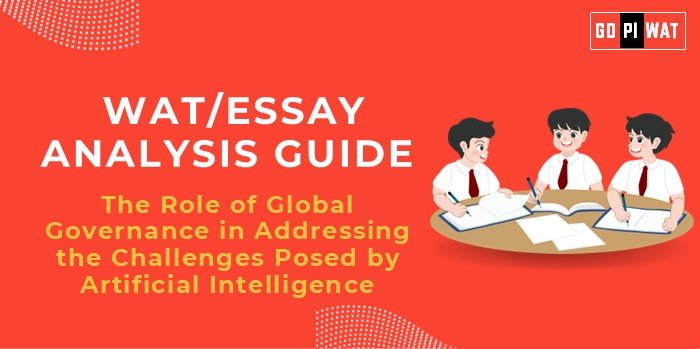📋 Written Ability Test (WAT)/Essay Analysis Guide
🌍 Topic: The Role of Global Governance in Addressing the Challenges Posed by Artificial Intelligence
📖 Understanding the Topic’s Importance
💡 Global governance’s role in AI is a critical subject, linking technological innovation to ethics, international cooperation, and economic balance. It resonates with B-school themes like global strategy, policymaking, and ethical leadership.
🕒 Effective Planning and Writing
- ⏱️ Time Allocation:
- Planning: 5 minutes
- Writing: 20 minutes
- Review: 5 minutes
- 📚 Preparation Tips:
- Research current AI statistics and examples of frameworks like UNESCO AI guidelines.
- Understand the roles of key stakeholders, including governments, tech companies, and international organizations.
✍️ Introduction Techniques
- ⚖️ Contrast Approach:
“While AI transforms industries globally, its unregulated use threatens societal equity and international security.”
- 📜 Timeline Approach:
“From IBM’s early AI breakthroughs to ChatGPT’s debut in 2023, AI’s rapid evolution calls for urgent global governance.”
📚 Structuring the Essay Body
- 🏆 Achievements:
- Highlight successes like the EU’s AI Act and AI’s role in accelerating healthcare innovations during the pandemic.
- Discuss ethical AI frameworks implemented by countries like Estonia and Canada.
- ⚠️ Challenges:
- Address fragmentation in global AI policies, with nations adopting divergent regulatory approaches.
- Discuss ethical dilemmas like bias in AI systems and risks of misuse in surveillance or autonomous weapons.
- 🌏 Future Outlook:
- Emphasize the need for partnerships between governments, private sectors, and academic institutions.
- Propose global AI standards to ensure equitable development and ethical innovation.
🔑 Concluding Effectively
- ⚖️ Balanced Conclusion:
“Global governance in AI is both an opportunity and a challenge. Its success lies in uniting diverse perspectives for ethical innovation.”
- 🌍 Future-Focused Conclusion:
“As AI reshapes societies, cohesive governance is essential to balance growth with accountability.”
📊 Analyzing Successes and Shortcomings
- 🏆 Key Achievements: Implementation of ethical AI frameworks and improved outcomes in sectors like healthcare and education.
- ⚠️ Ongoing Challenges: Geopolitical divisions over AI regulations and increasing cybersecurity threats linked to AI advancements.
- 🌏 Global Context: Estonia and Canada’s leadership in ethical AI policies serve as benchmarks for global governance efforts.
🌱 Recommendations for Sustainable Progress
- 📜 Promote international AI pacts to harmonize regulations and encourage collaboration.
- 📈 Invest in cross-border AI research initiatives to share knowledge and innovation.
- 📚 Develop inclusive AI literacy programs to reduce digital divides and increase public trust.
📄 Sample Short Essays
- ⚖️ Balanced Perspective:
“AI governance is a shared responsibility. A balanced framework is essential to mitigate risks and ensure innovation benefits all.”
- 💡 Solution-Oriented:
“Global AI standards and ethical guidelines can align nations and industries toward sustainable growth.”
- 🌏 Global Comparison:
“Comparing AI governance in the EU and US reveals gaps that global governance can bridge for shared progress.”


